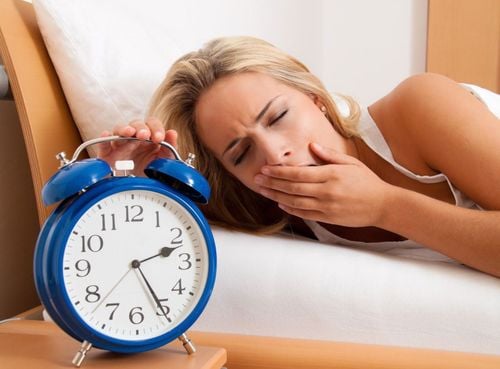This is an automatically translated article.
Recent studies also show that insufficient or poor quality sleep can lead to lower levels of physical activity the next day. For these reasons, experts today believe that sleep and exercise have a two-way relationship. In other words, optimizing your exercise routine can help you sleep better, and getting enough sleep can promote healthier levels of physical activity during the day.1. How does exercise affect sleep?
Regular exercise has many benefits such as a reduced risk of cancer, diabetes, improved physical function and a higher quality of life.Exercise may also benefit certain groups. For example, pregnant women who participate in regular physical activity are less likely to gain excess weight or experience postpartum depression, and older adults who exercise have a lower risk of injury from a fall.
An undeniable benefit of regular exercise is that it helps improve sleep for many people. The relationship between exercise and sleep has been studied extensively for many years. Specifically, moderate to vigorous exercise can increase the quality of sleep for adults by reducing the time it takes to fall asleep - or the time it takes to fall asleep - and decrease the time they stay awake in bed during the night. . Additionally, physical activity can help reduce daytime sleepiness and, for some people, reduce the need for sleeping pills.
Exercise can also improve sleep in indirect ways. For example, moderate to vigorous physical activity can reduce the risk of excessive weight gain, thereby making the person less likely to experience symptoms of obstructive sleep apnea (OSA). . Approximately 60% of moderate to severe OSA cases have been attributed to overweight or obesity.
Many surveys have assessed sleep and exercise habits in adults. Among them was the National Sleep Foundation's 2003 American Sleep Exploratory Survey, which targeted adults between the ages of 55 and 84. Of those who responded to that survey, about 52 % said they exercised three or more times per week and 24% said they exercised less than once a week. Respondents in the second group were more likely to sleep less than six hours per night, experience moderate or poor sleep quality, struggle with falling asleep, and receive a diagnosis of a sleep disorder. such as insomnia, sleep apnea.
Another 2013 US sleep survey, which surveyed adults between the ages of 23 and 60 and focused on "Exercise and sleep", would show similar results. Approximately 76-83% of respondents participating in light, moderate exercise or vigorous activity reported very good or fairly good sleep quality. For those who don't exercise, that number drops to 56%. People who exercise were also more likely to get more sleep than they should during the work week.

Tập thể dục trước khi đi ngủ có thể giúp bạn cải thiện chất lượng giấc ngủ
2. Is exercising before going to bed harmful?
It was previously thought that intensive exercise within the 3 hour period before bed could negatively impact sleep because it could increase your heart rate, body temperature, and adrenalin levels. Some studies note that exercising before bed may not produce any negative effects.A survey found that the majority of people who exercise at 8pm or later quickly fall asleep, experience a deep sleep, and wake up feeling well-rested. Respondents who exercised between 4 and 8 p.m. reported similar percentages for these categories, suggesting that exercising at night may actually be beneficial for some people.
Other studies have shown similar results. Those who exercised in the evening reported slower-wave sleep (which is the deep sleep your brain and body has a chance to rejuvenate) and longer in rapid-eye-movement sleep than the control group. . However, the researchers also note that higher core temperatures - which can occur after intense exercise - are associated with lower sleep efficiency and longer periods of wakefulness after starting. sleep. So while exercising before bed may not be harmful, vigorous exercise in the hours before bed can affect sleep efficiency and total sleep time.
Because survey results among people who exercise at night can vary, you should base on your exercise time and intensity to choose what works best for your sleep. Certain exercises that can benefit your sleep include yoga, light stretching, and breathing exercises.
3. Exercise for better sleep
The relationship between people who enjoy exercise and their sleep is profound. A person's preference for morning or evening activity can also play a role. Early risers were more likely to engage in physical activity than those who slept in or were more active in the evening. In fact, some studies have suggested that exercise can fundamentally change a person's daily preferences over time and may even alter their circadian rhythms.Exercise causes the body to release endorphins. These chemicals can induce a level of activity in the brain that can keep some people awake. These people should exercise at least 1 to 2 hours before going to bed, giving the endorphins time to "clean up" and the brain to "relax".
Exercise raises your core temperature. The effect of exercise in some people is like taking a hot bath to wake you up in the morning. Elevated body temperature signals the body clock that it is time to wake up. After about 30 to 90 minutes, core body temperature begins to drop. The decline will help facilitate sleepiness.
However, not all exercise has the same effect on your sleep. If you plan to exercise in the evening, choose your activity wisely and consider the exact timing of that exercise. It's best to choose light to moderate intensity activities. This level of activity can help you fall asleep faster and get better quality sleep.

Không phải tất cả các bài tập thể dục trước khi đi ngủ đều có tác dụng như nhau
If it is difficult to do 30 minutes at a time, you can break this time into two 15-minute exercises a day, 5 days a week. Or if you prefer a more strenuous workout, get at least 75 minutes of intense activity each week. Just make sure that you don't do this exercise within a few hours of bedtime. This will give your body enough time to relax.
Some examples of light to moderate intensity activities are :
Yoga Stretching Walking Walking Gentle Cycling Light Swimming Light Weightlifting Moderate Weightlifting Avoid vigorous exercise in the evening. Strenuous physical activity can stimulate your nervous system and raise your heart rate excessively, making it difficult to fall asleep.
Some examples of intense activities such as
High Intensity Interval Training (HIIT) Running Jumping Rope Bicycle racing Heavy weightlifting
4. Some notes to have a good night's sleep after exercising at night
Keep a consistent sleep schedule. Wake up and go to bed at the same time every day, including your weekend or day off. Keeping a consistent sleep schedule can help stabilize your body clock. Avoid electronic devices before going to bed. Turn off TVs, smartphones, laptops and other electronic devices 30 minutes before going to bed. The lights from these devices can stimulate your brain and keep you awake. Make it a habit to relax before you go to bed. Take a warm bath, listen to soothing music, and do some yoga or stretching poses, or meditate before bed.
Sau khi tập thể dục trước khi đi ngủ, bạn có thể thư giãn bằng việc tắm nước ấm
Sleep at a comfortable temperature. Keep your sleeping temperature at or near 18.3°C. Make sure your mattress and pillows are comfortable and in good shape. Avoid eating a lot before going to bed. Try not to eat a large meal for a few hours after you go to bed. If you're hungry, have a snack like toast or a piece of fruit. Avoid nicotine, alcohol, and caffeine before bed. These substances can make it difficult to get quality sleep. Take a short nap. Avoid napping for longer than 20 to 30 minutes, especially in the afternoon. Taking a longer nap can make it harder to fall asleep at night. The lesson to be learned here is that a good night's sleep can help you feel more relaxed and motivated to exercise the next day, but a healthy amount of sleep alone may not be enough to make a change spontaneously. how much and how often you engage in physical activity.
Please dial HOTLINE for more information or register for an appointment HERE. Download MyVinmec app to make appointments faster and to manage your bookings easily.
References: sleepfoundation.org, hopkinsmedicine.org, healthline.com












